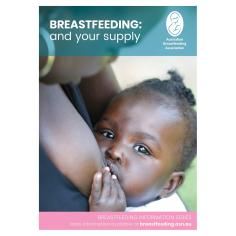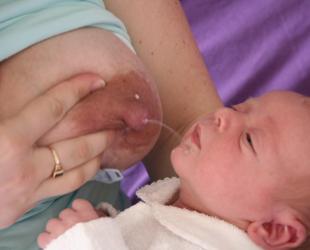Still feel like you're making too much milk?
Fast filling breasts, lots of poos, large weight gains and an unhappy baby can be signs of an oversupply.

In the early weeks of breastfeeding, some mums make more milk than their babies can easily cope with. Over about 6 weeks this usually settles down to a supply that matches your baby’s needs.
But sometimes it doesn’t.
Some signs that you may still be making too much milk:
- Your baby is older than about 6 weeks.
- Your breasts are often lumpy and tight, despite softening with a breastfeed.
- Your baby gags, gulps (especially at the start of a feed) and often will not take the second breast.
- Your baby gains a lot of weight quickly.
- They may be extra fussy between feeds, especially in the evening.
- You are changing many more than the usual number of heavy wet nappies.
- Your baby generally has a poo at each feed (or even more) that is often green and frothy (and possibly also explosive).
What causes oversupply after the newborn period?
Some things can contribute to a mum making too much milk for her baby.
-
You may have been timing feeds and switching sides after a set number of minutes.
-
Your baby may cry a lot and want to suck often for comfort, which causes your breasts to make more milk.
-
You may have created an oversupply by expressing. Some mums are told to also express in the early days to build a good supply. This extra demand can make more milk than your baby needs, and your breasts become full and sore. You then express for comfort, which makes the oversupply worse.
-
You may be using a silicone milk catcher to collect leaking milk or because your breasts feel overfull. Prolonged use of a milk catcher may result in more milk being removed from your breasts than your baby needs, creating an oversupply.
-
If you are worried about having a low supply, you may be feeding your baby more than they need and increasing your supply too much.
-
Some mums take medication or herbal products claimed to increase milk supply, 'just in case'. They may be worried about not making enough milk or they think their baby is crying a lot from hunger.
-
Perhaps your baby has been unwell, or has discomfort from a difficult birth, and is wanting to suck more for comfort.
Some mums just tend to make more milk than other mums. There is a normal range in this as in everything else about our bodies. In the past, these may have been the mothers who could have made a living as wet nurses!
What can I do if I keep making too much milk?
Think about the situations above and make changes if necessary. Then...
-
Try feeding from one breast at each feed. You may need to express just enough from the other breast to keep yourself comfortable.
-
If your baby hasn’t settled, and it is less than an hour since the last feed, offer the same breast again.
-
Try the ideas for feeding with a fast flow.
-
Space breastfeeds at least 2 ½ hours apart during the day, possibly feeding a little more often in the evening. Carry baby upright in between feeds to comfort them.
-
Catch leaking milk using a simple container or cloth (or a breast pad) rather than a silicon milk catcher, which removes more milk than would normally leak out.
Your baby may or may not be happy with the change in feeding pattern. You may need to adapt to find something that works for you.
If your baby needs comfort but isn't hungry you could:
-
Use soothing techniques such as rocking, cuddling or singing to your baby or massage or deep baths.
-
Carry your baby in a sling; take them for a walk.
-
Offer your baby a clean finger to suck on or a dummy. However, you may like to avoid dummies in the early weeks and only use one if your breastfeeding is going well.
Check your breasts carefully for signs of breast inflammation and begin treatment straight away.
An ongoing oversupply may cause a lactose overload in your baby. Changing baby's feeding pattern can sometimes help.
© Australian Breastfeeding Association February 2023
Read more about too much milk
Evidence-led info and practical tips from our Breastfeeding Information Series
Breastfeeding: and your supply




